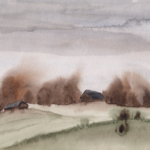You’ll Write like the Wind!
Writing Resources Article by Desiree Villena

We’ve come a long way since the days of painting stories on cave walls. Just as storytellers have evolved over the centuries, so have their tools: from clay to papyrus to parchment, reed swapped for quills swapped for biros, typewriters replaced by computers (though some of us still prefer to hear the keys clacking).
And today? Today, there are so many tools available that writers are spoilt for choice! So to properly equip you for every stage of the writing process, I’ve put together this guide that’ll point you in the direction of the most helpful writing resources to have in your author toolbelt.
1. Writing prompts
Imagine: the page before you is as vast and empty as the desert; inspiration as elusive as water. You’re the only person for miles, and the one thing that can bail you out is your own imagination (which at this point is pretty parched). You’re ready to renounce your pipe dream for what it is. But wait! In your writer’s survival kit you find your emergency writing prompts. Like a bottle of water in the desert, these potent little story-starters can seriously perk you up when you’re in the throes of writer’s block.
Even if you haven’t come to a total standstill, you might worry that your writing lacks originality, or that you’re constantly writing about the same tired subjects. Writing prompts will force you to get outside of your comfort zone, remove those elements that might be hindering your writing, and stretch your creative muscles.
Be smart about how you use them, and they can also help bolster a work-in-progress. Even if what you write doesn’t make it into your final draft, exploring uncharted territory will help you build a richer story. For example, if you want to develop your protagonist, you might drop them into a what-if scenario. Or if you want to work on your supporting cast, you could try making each secondary character the star of their own prompt-inspired snippet.
If I’ve convinced you of their value, then you won’t need to look far to find great writing prompts. There are a number of writing contests built around quirky story-starters, but if you’re looking for something pressure-free, take a peek at the Twitter hashtag #writingprompts, or check out the WordPress prompts calendar for daily inspiration. With this writing resource in your toolbelt, you’ll write like the wind: all you have to do is catch the right breeze (or prompt).
2. Story outline templates
Got a million-dollar idea, but find yourself faltering every time you put pen to paper? A story outline may just be your ticket to succes. Far from shackling your creativity (as devoted pansters would have you believe), a story outline will provide the foresight you need to finish your story, helping you progress faster and with greater confidence — especially if you’re a first-time author. If prompts are the bottle of water in your survival kit, then an outline is your map!
Of course, before you dig around in the toolbox, it’s crucial that you find the right sort of outline for you. Every author has their own unique outlining system (you can find the sketched-out plans of countless bestselling authors online, though piecing together the logic behind their scribbles is about as straightforward as reading ancient runes). If you tend to write scenes as they pop into your head, you’ll need an outline that gives you the freedom to shuffle your plot; if you like to build your worlds organically, then a detailed mind map might be the way forward.
When you have an idea of your ideal outline style, then you can equip yourself with the right tools. While a pen and a print-out template will work perfectly fine, 21st-century writers have the option of something a little more sophisticated!
Evernote and Scrivener are both incredibly helpful writing resources here, providing comprehensive storyboard templates for everything from classroom notes to recipes to full-length novels. Scrivener’s corkboard function, which lets writers pin and shuffle notes, scenes, and chapters to their heart’s content, makes it a firm favorite. However, as a brainstorming tool, Evernote excels, providing a space to jot down thoughts, record audio notes, and save reference points — then sync all of this information across your devices.
3. Editing software
In this day and age, it’s hardly surprising that online writing tools don’t just cater to crafting your novel, but to editing it too! A thorough edit is something you cannot skip — which is why working with a professional editor is an investment well worth considering. But in the meantime, there are lots of helpful editing resources available for free online.
One of the most important steps in a self-edit is trimming the fat. To that end, my first recommendation for first-time authors would be the Hemingway app, as its main function is to help you keep things short and sweet. This editor scans your prose and highlights complex sentences, as well as instances of passive voice, qualifiers, and adverbs for you to reduce. Though simplicity is this app’s trademark, it’s these “simple” elements that can really make or break a piece for a first-time author. Plus, who doesn’t want to tap into their inner Hemingway?
The Reedsy Book Editor is another helpful writing resource for any author looking to self-publish. By typesetting as you write, it turns your manuscript into a fully formatted book that can compete with traditionally published, professionally formatted books. You can export it as an EPUB, MOBI, or PDF file, so whether you’re looking to publish an ebook or a paperback, your book will be distribution-ready!
4. Productivity tools
Then again, often the problem doesn’t lie in the act of writing, but in finding the time and the space to do it. I’m sure we’re all dreaming of the day when the world returns to normal and we can go on a Dreamers Writing retreat. But until then, the best I can do for you is Ommwriter — the “perfect place to think and write.”
With its selection of soothing background noises, peaceful screensavers, and calming keyboard sounds, Ommwriter is the ideal tool if your best writing ideas come to you after a ritual of long, deep breaths, or if you use therapeutic writing as a means of wellness, to reflect and heal.
When you really want to create a Zen, interruption-free space (or if you need some tough love to be firing-on-all-cylinders productive) then you might be in the market for Freedom. This handy piece of software curbs your internet and social-media procrastination by blocking potential distractions across all of your devices. This is definitely my favorite time management tool for one simple reason: it works! (Unlike my fickle willpower.) I don’t come away feeling restricted, but relieved that I’ve had the freedom to write.
5. Critique circles
Contrary to popular belief, authors aren’t solitary creatures. The romanticized image of a writer — typing away in a dimly lit study while in their head they romp through an imaginary world — is far from the truth, which is that sometimes we need nothing more than company.
Indeed, writers can do a lot to help each other: sharing resources, swapping trade secrets, and exchanging manuscripts for critique. Unfortunately, accidents of geography (and the occasional pandemic) can stop us from meeting up as often as we’d like. But with plenty of writing groups studding the netscape, you don’t even have to leave your writer’s den to find like-minded people!
The most famous online writing community is Critique Circle — a free, members-only site that centres around feedback. As a newly enrolled writer you’ll have to earn credits by offering feedback to other users; but once you’ve reviewed the work of three writers, you’ll earn enough to post your own manuscript for review. Though the quality of feedback can vary, what’s so great about Critique Circle is that there are plenty of experienced members standing by to support newbies as they get comfortable with the art of constructive criticism.
As well as making it easy to find eagle-eyed readers who can max out the potential of your work-in-progress, this online space also offers productivity workshops, storyboarding tools, writing prompts, and much more. So if you want to try out any of the other helpful writing resources on this list, just know that you don’t have to do it alone.
About the Author of this 5 Most Helpful Writing Resources for the First-Time Author

Eve Lynch is a writer with Reedsy, a marketplace that connects authors with the world’s best publishing resources and professionals. In her spare time, Eve enjoys travelling with friends and reading literary fiction, so she’s often on the lookout for scenic new places to sit down with a book — or do a little writing of her own!

Last chance! Stories of Place, Home, and the Meaning of Dreaming
The deadline for the Dreamers Writing Contest on place and home is January 31. Submit a heartfelt story, poem, or essay reflecting on belonging, memory, displacement, or the meaning of home. Open internationally. $250 CAD prize and publication.

Editor’s Note: Issues 21 and 22
We’re pleased to announce the simultaneous release of Dreamers Magazine Issues 21 and 22.These two issues were shaped during very different moments…